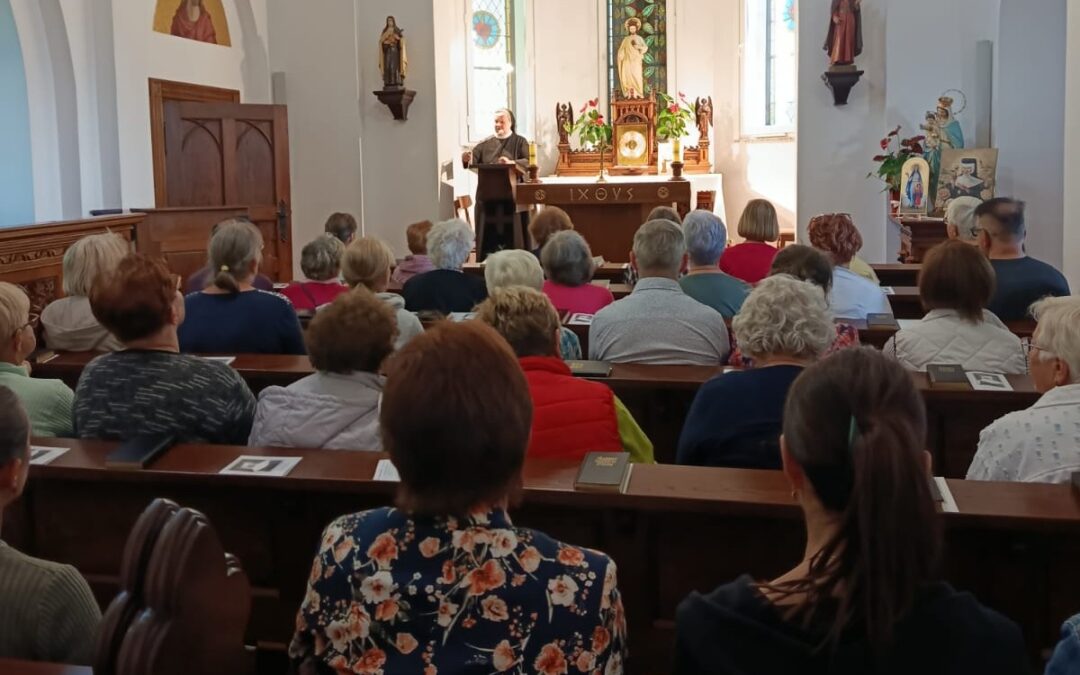
May 25, 2025 | DAILY BREAD
6th Sunday of Easter
Second Reading Apocalypse 21:10-14,22-23
The Easter season reaches its radiant fullness in the vision of the heavenly Jerusalem, where the light of the Risen Christ banishes all darkness. As described in the Apocalypse, this city has no need of sun or moon, for it is illuminated by the glory of God, and the Lamb—Christ crucified and risen—shines as its eternal torch. This image is not only a promise for the future but a truth for the present: wherever Christ is welcomed, there is light. His Resurrection becomes the dawn that never fades, dispelling the shadows of fear, sin, and despair. In this light, we learn to walk by faith, to live in hope, and to see each other with the eyes of love. Easter reminds us that the true source of all illumination is not celestial bodies, but the living presence of the Risen Lord, who lights our path toward the fullness of life. Let’s reflect: Easter is the radiant victory of the Risen Christ, whose presence becomes the unfading light that illuminates our lives and leads us into the glory of God’s eternal dwelling.
Don Giorgio

May 24, 2025 | NEWS
With Sister Dulcissima to the depths of the heart
In Kokoszyce, at the Retreat Center of the Archdiocese of Katowice, an extraordinary retreat dedicated to the Mother of God took place. Its theme, “With Mary to the depths of the heart,” led participants into a world of prayer, reflection, and entrustment, so close to the spirituality of Sister Dulcissima Hoffmann.
Each day of the retreat was a true spiritual feast, from communal rosary prayers and adoration of the Blessed Sacrament to reflections on the Word of God in a Marian spirit. In their conferences and homilies, Fr. Przemysław Krakowczyk, SAC, and Sr. Małgorzata showed how Mary accompanies us in our daily lives, leading us to Jesus and helping us to discern God’s will.
The central moment of the day was the Eucharist, celebrated with deep concentration and joy. In the silence of the retreat house, participants were able to entrust their intentions, requests, and thanks to Mary through the intercession of Sister Dulcissima.
There was also time for personal reflection and rest surrounded by nature, which was conducive to calm and encounter with God. Many participants emphasized that these retreats were a time not only of prayer but also of inner strengthening, finding peace, and renewing their relationship with Mary.
The retreat in Kokoszyce reminded us that Mary is a Mother who constantly leads us to Christ, and the figure of Sister Dulcissima is an inspiration to many on how to entrust their lives to God with simplicity and humility.
Sister Małgorzata Cur, SMI

May 24, 2025 | NEWS
Last weekend in Racibórz was a true celebration of spirit and culture. From May 16 to 18, the heart of the city beat to the rhythm of prayer, reflection, art, and music. All this was thanks to the fourth edition of Dulcissimia Days, which attracted residents and visitors eager to experience something unique.
On Friday evening, participants gathered at the Church of St. Matthew and St. Matthew the Apostles to enter into the atmosphere of spiritual encounter in silence and prayer. The atmospheric vigil allowed them to break away from everyday life and immerse themselves in the depths of prayer and reflection.
On Saturday, everyone moved to the Piast Castle in Racibórz, where the symposium “S. M. Dulcissima in Art and Oratory” delighted with a wealth of topics and the personalities of the speakers. Inspiring lectures, passionate discussions about spirituality, literature, the singing soul of Sister Dulcissima, as well as meetings with exceptional guests meant that there was something for everyone. A solemn Holy Mass presided over by Bishop Jan Kopiec and meditation on the icon “St. Thérèse of Lisieux and her spiritual friend Sister Dulcissima” added depth and beauty to the event.
The evening debate “Does the modern world need saints?” touched hearts and minds, provoking reflection on the place of holiness in today’s world. And later? Marcin Styczeń’s atmospheric concert “Święci” (Saints) resounded with music that transported listeners into a world of poetry and spiritual delight.
Sunday was a time of joy and family celebration. Holy Mass presided over by Bishop Andrzej Czaja, a family picnic in the monastery garden in Brzezie, and the May Concert of Sacred Music created an atmosphere full of warmth and community. The Brzezie Choir, guest choirs from the Czech Republic, the Youth Symphony Orchestra of the State Music School in Gliwice, and invited artists provided musical emotions that will remain in the memories of the participants for a long time.
The Dulcissimia Days showed how important it is to pause, celebrate together, and share beauty. It was a time full of emotion, spiritual depth, and encounters that will remain in the hearts of all those present for a long time.
The Dulcissimia Days have once again proven that the figure of Sister M. Dulcissima Hoffmann can inspire both spiritual reflection and creative encounters with art.
The organizers—the Congregation of the Sisters of Mary Immaculate, Polish Province, Racibórz County, and Piast Castle—are already inviting everyone to the fifth edition of the event.
Sister Małgorzata Cur, SMI

May 24, 2025 | DAILY BREAD
Saturday of the 5th week of Eastertide
First reading Acts 16:1-10
The Spirit who guided Paul across unfamiliar lands, closing some doors and opening others, continues to be the living compass of the Church today. In the Acts of the Apostles, we see not just a missionary strategy but a divine choreography, where the Holy Spirit orchestrates each movement with wisdom and purpose. Easter reminds us that the Risen Christ has not left us orphaned—His Spirit lives in the Church, animating her mission, shaping her journey, and whispering truth into the hearts of the faithful. As we walk the path of faith, may we learn to trust the quiet, persistent voice of the Spirit who still leads, still sends, and still builds the Body of Christ in the world. Let’s reflect: Easter is the celebration of the Risen Christ who, through the guidance of His Spirit, continues to lead and animate the Church in her mission across the world.
Don Giorgio

May 23, 2025 | DAILY BREAD
Friday of the 5th week of Eastertide
First reading Acts 15:22-31
The Easter mystery calls us back to the heart of the Gospel: that in the death and resurrection of Jesus Christ, God has shattered the weight of sin and opened to us the path of new life. In this light, the reading from Acts 15 offers a profound reflection on the nature of Christian freedom and the discernment of essentials. As the early Church faced cultural differences and pastoral tensions, it did not respond with rigidity or excessive demands, but with a Spirit-led wisdom: “It has been decided by the Holy Spirit and by us not to burden you beyond these essentials.” This decision reveals a vital truth of Easter faith—that the Gospel is not a system of burdensome laws, but a proclamation of grace, mercy, and joyful obedience. Easter reminds us that what truly matters is not an accumulation of rules, but the inner transformation that comes from a living relationship with the Risen Lord. The essentials are few: to love God, to love one another, to turn away from idols, and to remain pure in heart. When we cling to what is essential, we allow the Holy Spirit to guide us with peace and clarity, lifting the weight of unnecessary burdens and drawing us ever more deeply into the joy and simplicity of the Resurrection. In a world often caught in overcomplication and anxiety, the Easter message invites us to rediscover the liberating power of Christ’s love, which alone makes all things new. Let’s reflect: Easter is the joyful celebration of the liberating power of Christ’s Resurrection, which frees us from unnecessary burdens and calls us to live by the essential truths of faith, guided by the Holy Spirit.
Don Giorgio





